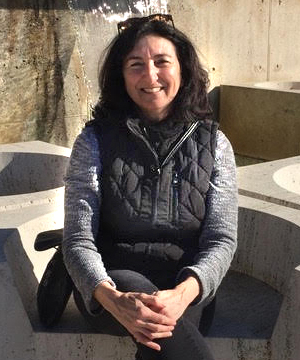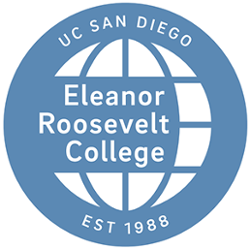Minor in Human Rights and Migration
Offered by Eleanor Roosevelt College
To receive a minor in Human Rights and Migration, a student must complete twenty eight units: including two required courses (see below) and twenty additional units. The additional twenty units may be satisfied either by a) five additional four-unit classes from the list of approved electives, or b) internships through AIP or field research in the Mexican Migration Field Research Program (MMFRP). Additional courses may approved by special petition to the program Directors.
Since the human rights and migration minor is an interdisciplinary program, students are allowed to take no more than three courses in any one department. All courses (except internships) must be taken for letter grade.
Required Courses
One of the following human rights focused courses:
1) Satisfy human rights related courses as follows:
One course from those listed under HMNR 100:
OR
One course from those listed under HMNR 101:
AND
2) Satisfy one immigration related course as follows:
POLI 140D. International Human Rights Law: Migrant Population
POLI 150A. The Politics of Immigration
SOCI 125. Sociology of Immigration
USP 162. Migration and the City.
For this minor, students must fulfill twenty additional units,
either through Track A or Track B
TRACK A - COURSE WORK
(Choose any five four-unit courses from the following list, or petition for other courses to be accepted)
ANTH 21. Race and Racisms
ANTH 23. Debating Multiculturalism: Race, Ethnicity, and Class in American Societies
ANSC 131. Language, Law, and Social Justice
ANSC 140. Human Rights: Contemporary Issues
ANSC 144. Immigrant and Refugee Health
ANSC 151. US-Mexico Border Ethnographies
ANSC 153. War in Lived Experience
ANSC 155. Humanitarian Aid: What Is It Good For?
ANSC 158. Comparative Anthropology of Crisis
ANSC 176. The Meaning of Political Violence
ANSC 185. #BlackLivesMatter
ANSC 186. Gender and Incarceration
ANSC 196. The Human Rights Advocacy Seminar
CGS 106. Gender Equality and the Law
COMM 108D. POB: Disability
COMM 111B. Global Borders Communication and Conflict
COMM 114A. Human Rights, Communication and Contemporary Global Justice
COMM 114B. Human Rights Advocacy Seminar: Journalists, Activists and Scholars At Risk
COMM 114F. Law, Communication, and Freedom of Expression
COMM 131. Communication, Dissent, and the Formation of Social Movements
COMM 158. Representations of the Israeli/Palestinian Conflict
COMM 163. Concepts of Freedom
COMM 166. Surveillance, Media, and the Risk Society
COMM 183. Global Economy and Consumer Culture
ETHN 103. Environmental Racism
ETHN 109. Race and Social Movements
ETHN 152. Law and Civil Rights
HITO 119. Introduction to Human Rights and Global Justice
HITO 134. International Law—War Crimes and Genocide
HIUS 136. Citizenship and Civil Rights in the Twentieth Century
LATI 10. Reading North by South: Latin America Studies and the US Liberation Movements
LAWS 101. Contemporary Legal Issues
LTCS 125. Cultural Perspectives on Immigration and Citizenship
PHIL 167. Contemporary Political Philosophy
PHIL 168. Philosophy of Law
POLI 104I. Law and Politics—Courts and Political Controversy
POLI 104M. Law and Sex
POLI 104B. Civil Liberties—Fundamental Rights
POLI 104C. Civil Liberties—The Rights of Criminals and Minorities
POLI 108. Politics of Multiculturalism
POLI 111B. Global Justice/Theory and Action
POLI 122. Politics of Human Rights
POLI 122D. Abuse of Power
POLI 131. Muslim Integration and Exclusion
POLI 135. Comparative LGBT Politics
POLI 140A. International Law and Organizations
POLI 140D. International Human Rights Law: Migrant Populations
SOCI 127. Immigration, Race, and Ethnicity
SOCI 163. Migration and the Law
SOCI 140F. Law and the Workplace
SOCI 174. Introduction to Human Rights and Global Justice
SOCI 175. Nationality and Citizenship
SOCI 177. International Terrorism
USP 162. Migration and the City
USP 163. Community-Based Research and Planning (4)
USP 188. Field Research in Migrant Communities—Practicum (8)
USP 188B. Research Analysis and Reporting (4)
TRACK B - INDEPENDENT RESEARCH (199) OR INTERNSHIP (AIP)
Internships or field research:
After completing requirements 1 and 2 (see “Required Courses” for the minor above), students may choose to complete their minor by doing independent research or internships. Students choosing this track will receive intensive training through academic internships in a local immigrant/refugee service-providing organization or conduct independent research in the area. Students are required to take one upper-division research methods course from the following:
- ANSC 138. The Cultural Design Practicum: Using Anthropology to Solve Human Problems
- ANSC 173. Ethnography in Practice
- COMM 101A. Media Activism
- COMM 101E. MPL: Ethnographic Methods for Media Production
- COMM 102C. MMPP: Practicum in New Media and Community Life
- COMM 114B. Human Rights Advocacy Seminar: Journalists, Activists and Scholars At Risk
- COMM 114K. CSI: Community Fieldwork (can be repeated)
- ETHN 190. Research Methods: Studying Racial and Ethnic Communities (cross-listed as USP 129)
- POLI 160AA and AB. Introduction to Policy Analysis
- POLI 168. Policy Assessment
- POLI 170A. Applied Data Analysis for Political Science
- POLI 171. Making Policy with Data
- SOCI 104. Field Research: Methods of Participant Observation (prerequisite: SOCI 60, SOCI majors only)
- SOCI 108. Survey Research Design (prerequisite: SOCI 60)
- SOCI 109M. Research Reporting
- SOCI 110. Qualitative Research in Educational Settings
- SOCI 188. Fieldwork in Migrant Communities
- USP 163. Community-Based Research and Planning (4)
- USP 188. Field Research in Migrant Communities—Practicum (8)
Complete the remaining sixteen units for this track through a combination of:
- Courses from the list under Track A and
- 199: Independent Studies courses (four units each) in order to pursue a field research project with a faculty member (this includes the Mexican Migration Field Research Program (MMFRP)*;
or
- Completing an approved internship in a non-governmental organization/agency that services immigrants or refugees in the San Diego area. Internships up to eight units arranged by the Academic Internship Program (AIP)**and be approved by the minor faculty advisor.
Declaring the Minor
This minor is open to all undergraduate UC San Diego students.
To declare the minor, students must use the Major/Minor Tool in Tritonlink and input the seven courses or 28 units they plan on using to complete the minor (see REQUIRED COURSES FOR THE MINOR above for details). Students are encouraged to use this Minor Planning Worksheet to develop their initial courselist.
- Lower-division classes can overlap with your major, GE requirements, and your minor.
- Two upper division courses may overlap between your major and minor (pending department approval).
- Only three courses allowed in any one department.
- Check with your college advising office for any restrictions regarding overlaps between minor and GEs.
- Students cannot overlap upper-division courses for their minor and any other minor requirements.
- Because AIP 197 and 199 courses are offered as Pass/No Pass, students must be careful not to exceed the 25% limit. Each student should check with their college to determine their Pass/No Pass eligibility.
- Minors are considered optional and are not required for graduation. If you are unsure whether a minor fits into your graduation plan, please make an appointment with your college academic advisor.
Annual Course Offerings
Opportunities!
- Blum Summer Field internship
- Center on Global Justice Community Stations
- Human Rights Fellowship
- Human Rights Internship Opportunities San Diego
- Human Rights Internship Opportunties International
- Human Rights Internship Opportunities Washington D.C,
- Events at the Joan B. Kroc Institute for Peace & Justive
- Clinton Global Initiative University at UCSD!
- Center for Comparative Immigration Studies (CCIS)
- Academic Internship Office
- Mexican Migration Field Research Program (MMFRP)
- Refugee San Diego
Faculty Directors
Tom K. Wong
Associate Professor of Political Science Director, U.S. Immigration Policy Center Co-Director: Human Rights & Migration Minor

Office: SSB 363
Tom K. Wong is an associate professor of political science and founding director of the U.S. Immigration Policy Center (USIPC) at the University of California, San Diego. He served as an advisor to the White House Initiative on Asian Americans and Pacific Islanders (WHIAAPI) under the Obama administration where he co-led the immigration portfolio and was appointed by Governor Gerry Brown to serve on the State of California 2020 Census Complete Count Committee (CCC). He is also winner of the ACLU Presidential Prize, which is given to an academic who has made outstanding contributions to civil rights and civil liberties. He is also Co-Director of the Human Rights and Migration program. His research focuses on the politics of immigration, citizenship, and migrant "illegality." As these issues have far-reaching implications, his work also explores the links between immigration, race and ethnicity, and the politics of identity. His first book, Rights, Deportation, and Detention in the Age of Immigration Control, analyzes the immigration control policies of twenty-five Western immigrant-receiving democracies (Stanford University Press, 2015). In analyzing over 30,000 roll call votes on immigration-related legislation in Congress since 2005, his second book, The Politics of Immigration: Partisanship, Demographic Change, and American National Identity (Oxford University Press, 2017), represents the most comprehensive analysis to date on the contemporary politics of immigration in the United States.
Wong's research has been used by policymakers both in the U.S. and in Mexico, as well as by organizations that serve immigrant communities. Wong’s research has been used in several federal lawsuits to defend DACA, end family separation at the southern border, and prohibit indefinite child detention, among others. Wong and his work has been covered by The New York Times, The Los Angeles Times, The Washington Post, NPR and major media outlets across the country in hundreds of articles.
He is also on the board of the California Immigrant Policy Center. Wong also consults on campaigns elections and has run large-scale c3, c4, and independent expenditure campaigns specializing in mobilizing low-propensity voters of color and immigrant communities. He is lead evaluator for the Four Freedoms Fund civic engagement program and lead evaluator for the RISE Together Fund civic engagement program.
Elana Zilberg
Associate Professor

Co-Director with Professor Matilde Córboba Azcárate, Nature, Space and Politics, International Institute https://naturespacep
Principal Investigator, The University of California Collaboratory for Ethnographic Design (CoLED) http://coled.ucsd.edu/
Co-Founder with Professor Eli Elinoff, The Studio for Ethnographic Design http://sed.ucsd.edu/ (
Faculty Affiliate:
-
Center for Iberian and Latin American Studies https://cilas.ucsd.
edu/ -
Center for Comparative Immigration Studies https://ccis.ucsd.edu/
-
Chicanx and Latinx Studies https://cls.ucsd.edu/,
-
Ethnic Studies https://ethnicstudies.
ucsd.edu/
My earlier work focused on security, space, and mobility between the United States and Latin America. In my book Space of Detention: The Making of a Transnational Gang Crisis between Los Angeles and San Salvador (Duke University Fall 2011), I tracked the production of transnational space through the combined forces of neoliberalism and globalization, and the intersection between immigration, criminal, and antiterrorist law. My new work on urban river revitalization movements extends my interest in the production of space and urban built environment into the domains of urban nature, infrastructure, and environmental activism.
Trained as a cultural anthropologist, I am committed to exploring how ethnographic methodology can be of use to students in Communication and Science Studies, and how these disciplines push the method in new and productive directions. I teach graduate seminars on ethnographic methods and writing, and I am co-founder of the Studio for Ethnographic Design on campus.
